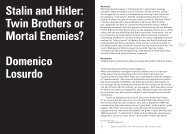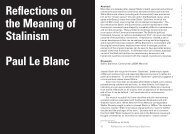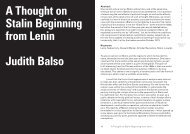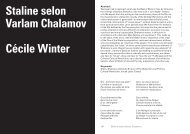adrian
adrian
adrian
- No tags were found...
You also want an ePaper? Increase the reach of your titles
YUMPU automatically turns print PDFs into web optimized ePapers that Google loves.
tacitly presupposes from its very outset, in order to get the dialecticalspeculativeball rolling even just from Being to Nothing, the conceptualand categorial distinctions introduced subsequently only with “TheDoctrine of Essence”) 8 ; and Robert Pippin for “The Doctrine of theConcept” (with the thesis that Hegel’s praise in “The Doctrine of theConcept” for Immanuel Kant’s “transcendental unity of apperception”of the Critique of Pure Reason’s “Transcendental Deduction” signalsthat the Logic arises from and is anchored by Kantian-style cognizingsubjectivity as per the “Subjective Logic” coming after the first twodoctrines together constituting the “Objective Logic”). 9 At least inLess Than Nothing, Žižek seems to be a partisan of “The Doctrine ofBeing” as the true launching platform for Hegelian Logic, albeit (bycontrast with, for instance, the example of Houlgate) with the caveat thatthe launch gets delayed until determinate Being-there congeals out ofBecoming.As regards questions and controversies about beginning(s) inHegel’s philosophy, I elect to zero in below on Pippin as a privileged foilfor Žižek, and this for two reasons: First, in Less Than Nothing, Žižekhimself does this; And, second, Pippin, by my estimation, has goodreasons for challenging the kinds of exegetical positions regardingthe true start of Hegelian Logic put forward by, among many others,Houlgate and Henrich. Apropos this second reason, Pippin’s positiondraws support from the facts that Hegel both characterizes Logic fromstart to finish as a “thinking about thinking” 10 as well as treats it as acircle whose end (“The Doctrine of the Concept”) rejoins its beginning(“The Doctrine of Being”), with the former retroactively making explicitwhat the latter always-already was implicitly (in the manner of T.S.Eliot’s “to arrive where we started and know the place for the firsttime”). 11 Apropos the first reason here, one of Žižek’s main objectionsto Pippin has to do with the latter’s renowned “deflationary” (i.e., post/anti-metaphysical) rendition of Hegel.Of course, Pippin is not the first or only advocate of a non-CRISIS&CRITIQUE#3metaphysical version of Hegelianism. A far from exhaustivealphabetical list of the names of partisans of this (diverse) family ofreconstructions would include: Robert Brandom, Klaus Hartmann,Jean-François Kervégan, Terry Pinkard, Paul Redding, and Allen Wood(with Karl Ameriks providing a helpful overview of some of the mainrepresentatives and orientations within this constellation of Hegelinterpretations 12 as well as criticizing Pippin in particular 13 ). Especiallyin the Anglophone world, this cluster of overlapping reconstructionsof Hegelian thought has influenced profoundly the past four decadesof Hegel scholarship, starting with Hartmann’s 14 and Charles Taylor’s 15interventions in the 1970s. Although Taylor proposes a metaphysicalreading of Hegel, he knowingly depicts this purportedly “cosmic”metaphysics to be too ridiculously puffed up to be a palatable, plausibleoption for philosophers of the present age, thus furnishing a sort ofreductio ad absurdum (one accepted by Wood, among others) in favor ofdeflationary discardings of the metaphysical aspects of Hegel’s System.Žižek rightly rejects Taylor-style depictions of Hegelian metaphysics. 16However, even more recently, a number of scholars of Germanidealism have begun to push back against the still rather fashionablenon/anti-metaphysical renditions of Hegel. Amongst the growing ranksof deflationism’s discontents are Frederick Beiser, 17 Brady Bowman, 18Markus Gabriel, 19 Rolf-Peter Horstmann, 20 Houlgate, 21 James Kreines, 2212 Ameriks 1992, pp. 177-202.13 Ameriks 1991, pp. 386-402.14 Hartmann 1972, pp. 101-124; Hartmann 1976, pp. 1-30.15 Taylor 1975, pp. 27, 39-40, 44-45, 537-571.16 Žižek 2012, pp. 285-286.17 Beiser 1993, pp. 1-24; Beiser 1995, pp. 1-13; Beiser 2002, pp. 558-560; Beiser 2005, pp. 55-57;Beiser 2008, pp. 1-14.CRISIS&CRITIQUE#38 Henrich 2010, pp. 104-105, 114-117, 121-128, 139-141, 143-150, 152-155; Henrich 2003, pp. 320-321.9 Pippin 1989b, pp. 6, 9, 17, 33-35, 76, 79-80, 83-85, 91, 96-98, 104, 108, 111-112, 114-115, 120-121, 124-125, 132, 139-142, 152-154, 167-170, 176, 182-183, 224-225, 241-242, 284, 304; Pippin 1990, pp. 843-844.18 Bowman 2013, pp. 5-7, 14-15, 18, 23-24, 36, 38, 97-98, 102-104, 109, 125, 133-135, 142-143, 145, 148-150, 153, 156, 181-182, 215-216, 219, 222-223, 227, 229-230, 238, 241, 247-248, 255-258.19 Gabriel 2011, pp. viii-ix, xii, xix-xxii, 1, 3, 54, 60.10 Hegel 1986c, §2 (p. 65); Hegel 1986d, §1 (p. 74); Hegel 1969a, p. 43-44; Hegel 1991c, §17 (p. 41),§19 (pp. 45-46); Hegel 2008, §19 (p. 1).11 Hegel 2002e, p. 249; Hegel 1986e, §86 (p. 122); Hegel 1969a, pp. 71-72, 838-842; Hegel 1971, §574(p. 313); Hegel 2008, §235-236 (p. 227).20 Horstmann 2004, pp. 133-134, 138-141.21 Houlgate 2006, pp. 137-143; Houlgate 2013, pp. 193-194.22 Kreines 2006, pp. 466-480; Kreines 2008, pp. 48-70.374 “Where to Start?: Robert Pippin, Slavoj Žižek...375“Where to Start?: Robert Pippin, Slavoj Žižek...






